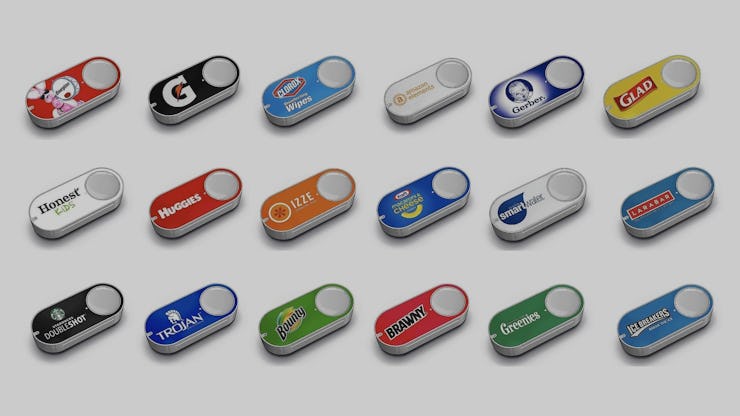Amazon's Adding More Dash Buttons That Few Actually Use
But hey, I guess it's working for them anyway.

Amazon Dash buttons are convenient, quirky, wondrously-futuristic, and, well, apparently not that useful, because people aren’t really using them. Nevertheless, Amazon is doubling down on its program, which can deliver us all kinds useful products like condoms (still slower than a mad-dash to the convenience store) and unlimited colored pencils. You could survive exclusively on Dash-Buttons, but we really wouldn’t recommend it.
The weird thing is, people are buying Dash buttons (which sound like a great deal at only $5 with a $5 rebate, so, free), but then they aren’t using them. If you’re looking for all the Dash buttons you could possibly buy and then use rarely or just forget about, here’s the Amazon Dash button list.
In a Slice Intelligence report from April, the market research firm found that only half of Dash button users actually buy stuff with them. Still, this works out pretty well for Amazon — the companies who sell their stuff via Dash button pay Amazon $15 per button, so they’re making money even if users don’t buy anything. The companies also have to cough up 15 percent of each purchase to Amazon, plus the normal commission of eight to 15 percent for selling any product on the Amazon marketplace, plus a $200,000 buy-in fee just to get in on the internet of things action.
Basically, the Dash buttons are a gimmick that Amazon has somehow managed to sell to companies who use it to market their product to customers, many of whom don’t actually use the Dash button to order the product.
And even more producers are jumping on board: at the end of March, Amazon added about 80 buttons, and the Wall Street Journal reports that there are about a dozen more companies with their own Dash button on the way. Sure, there’s no weed button yet, but programmers have figured out how to hack them into impromptu garage-door openers and Tesla-starters, which is useful.
We don’t know which companies have signed on to deliver their products at the touch of a button in this latest expansion, but the Journal and Slice Intelligence’s research so far suggests that people like using them for household items that they replace irregularly, like laundry detergent, but not so much for things they need every week, like diapers or paper towels. The Journal reports that “dozens” of brands will jump on board, but we don’t have a specific number yet either. But if the Dash buttons are your thing, get your button fingers ready to do (or, y’know, not do) a lot of domestic-goods impulse buying.